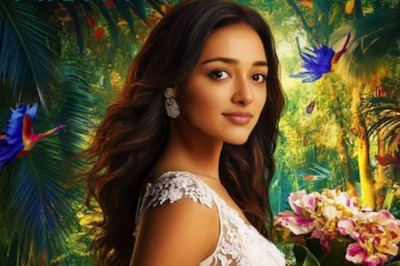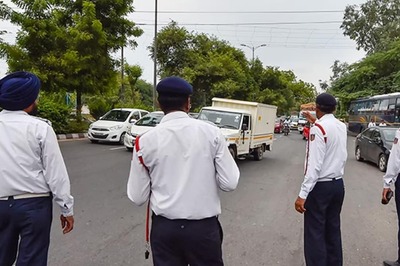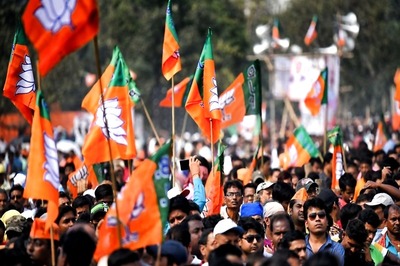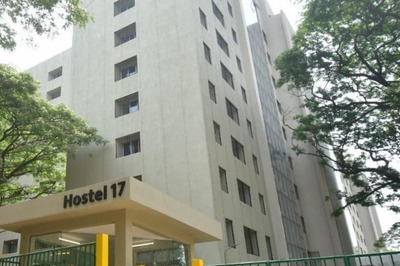
views
On our quest to explore these places in South Africa, we were accompanied by Zweli, a Zulu-South-African, that's how he described himself. This former teacher and now tourist-guide, spoke eloquently about his country, but what affected me the most was that he still carried with him anger and discontent towards the whites. He remembered the apartheid days, with full clarity.One of the reasons, he said, he didnt like wearing seatbelts was because during the apartheid days, blacks were forced to wear them and were severely penalised if they didnt, while whites were easily let off if they didnt follow the same rule.
It was abunduntly clear that he still doesnt see his country as being equal. His viewpoints on Zuma, the South African deputy president, who was involved in a controversial arms deal, is a very clear indication to how he thinks the whites look at Zulus like himself, which is with suspicion. He resents it. He is yet to come to terms with why it took his nation so long to overthrow apartheid only in 1994. His one comment nailed it, 'Why are all menial workers only black? Why dont you see even one white waiter? Why are most police officials white? Equality, we talk about it everyday, is it just a word anymore!" He resents the attitude, most whites carry towards blacks.
I remember talking to a person of Indian origin in Capetown, who considered himself culturally superior to zulus and blacks. And I'm no one to judge the dynamics of the relations between blacks and whites in South Africa, but somehow it got me thinking, when we talk about prejudices, just as our caste system seems peculiar to me so does the fact that colour of the skin means something to people. May sound like a juvenile comment, but that's exactly how I reacted, like a child would. For children, would never consider, the colour of skin to be of any importance to securing a job, getting a promotion, eating at a restaurant, in front of the law!
But not everything is bleak, I met many Indians in Durban, who've made South Africa their home, and wont ever consider moving to India. They love their country, despite its imperfections and they continue to follow Indian traditions, and they know their regional lanuguage, and have carried forward these traditions, to the next generation as well.
first published:October 14, 2006, 16:05 ISTlast updated:October 14, 2006, 16:05 IST
window._taboola = window._taboola || [];_taboola.push({mode: 'thumbnails-mid-article',container: 'taboola-mid-article-thumbnails',placement: 'Mid Article Thumbnails',target_type: 'mix'});
let eventFire = false;
window.addEventListener('scroll', () => {
if (window.taboolaInt && !eventFire) {
setTimeout(() => {
ga('send', 'event', 'Mid Article Thumbnails', 'PV');
ga('set', 'dimension22', "Taboola Yes");
}, 4000);
eventFire = true;
}
});
window._taboola = window._taboola || [];_taboola.push({mode: 'thumbnails-a', container: 'taboola-below-article-thumbnails', placement: 'Below Article Thumbnails', target_type: 'mix' });Latest News
A cold blast of air hits me as I walk out of the South African Airways plane towards the Johannesberg airport, after Mumbai's warm humid air, I almost welcome it, but only for a minute or two then I reach for my jacket. Johannesberg ressembles any developed nation, fast cars, highways, people rushing about to reach their work places. We were on a visit to Capetown and then to Durban and the Drakensberg mountain ranges, on an invitation from South African Tourism. The whole media junket was South Africa's bid to showcase the country as a prime tourist destination, eversince the country was chosen to host the 2010 FIFA world cup.
On our quest to explore these places in South Africa, we were accompanied by Zweli, a Zulu-South-African, that's how he described himself. This former teacher and now tourist-guide, spoke eloquently about his country, but what affected me the most was that he still carried with him anger and discontent towards the whites. He remembered the apartheid days, with full clarity.One of the reasons, he said, he didnt like wearing seatbelts was because during the apartheid days, blacks were forced to wear them and were severely penalised if they didnt, while whites were easily let off if they didnt follow the same rule.
It was abunduntly clear that he still doesnt see his country as being equal. His viewpoints on Zuma, the South African deputy president, who was involved in a controversial arms deal, is a very clear indication to how he thinks the whites look at Zulus like himself, which is with suspicion. He resents it. He is yet to come to terms with why it took his nation so long to overthrow apartheid only in 1994. His one comment nailed it, 'Why are all menial workers only black? Why dont you see even one white waiter? Why are most police officials white? Equality, we talk about it everyday, is it just a word anymore!" He resents the attitude, most whites carry towards blacks.
I remember talking to a person of Indian origin in Capetown, who considered himself culturally superior to zulus and blacks. And I'm no one to judge the dynamics of the relations between blacks and whites in South Africa, but somehow it got me thinking, when we talk about prejudices, just as our caste system seems peculiar to me so does the fact that colour of the skin means something to people. May sound like a juvenile comment, but that's exactly how I reacted, like a child would. For children, would never consider, the colour of skin to be of any importance to securing a job, getting a promotion, eating at a restaurant, in front of the law!
But not everything is bleak, I met many Indians in Durban, who've made South Africa their home, and wont ever consider moving to India. They love their country, despite its imperfections and they continue to follow Indian traditions, and they know their regional lanuguage, and have carried forward these traditions, to the next generation as well.




















Comments
0 comment